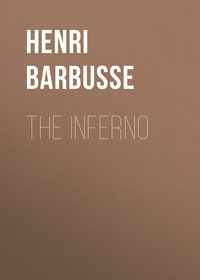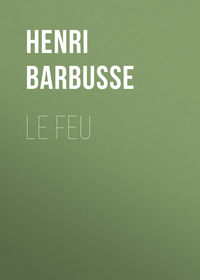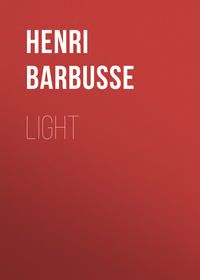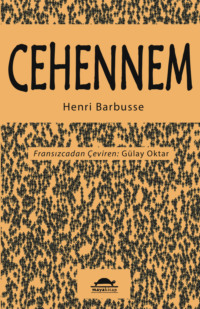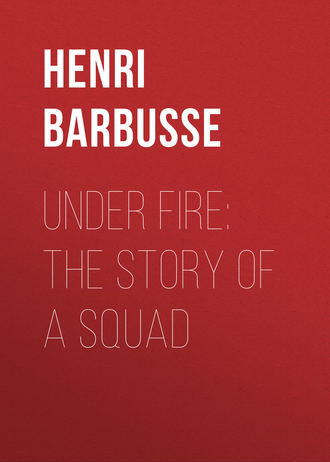 полная версия
полная версияUnder Fire: The Story of a Squad
Barque, who is an observant man, sends an itinerant glance around, takes his pipe from his mouth, spits, winks, and says—"I say, we don't resemble each other much."
"Why should we?" says Lamuse. "It would be a miracle if we did."
Our ages? We are of all ages. Ours is a regiment in reserve which successive reinforcements have renewed partly with fighting units and partly with Territorials. In our half-section there are reservists of the Territorial Army, new recruits, and demi-poils. Fouillade is forty; Blaire might be the father of Biquet, who is a gosling of Class 1913. The corporal calls Marthereau "Grandpa" or "Old Rubbish-heap," according as in jest or in earnest. Mesnil Joseph would be at the barracks if there were no war. It is a comical effect when we are in charge of Sergeant Vigile, a nice little boy, with a dab on his lip by way of mustache. When we were in quarters the other day, he played at skipping-rope with the kiddies. In our ill-assorted flock, in this family without kindred, this home without a hearth at which we gather, there are three generations side by side, living, waiting, standing still, like unfinished statues, like posts.
Our races? We are of all races; we come from everywhere. I look at the two men beside me. Poterloo, the miner from the Calonne pit, is pink; his eyebrows are the color of straw, his eyes flax-blue. His great golden head involved a long search in the stores to find the vast steel-blue tureen that bonnets him. Fouillade, the boatman from Cette, rolls his wicked eyes in the long, lean face of a musketeer, with sunken cheeks and his skin the color of a violin. In good sooth, my two neighbors are as unlike as day and night.
Cocon, no less, a slight and desiccated person in spectacles, whose tint tells of corrosion in the chemical vapors of great towns, contrasts with Biquet, a Breton in the rough, whose skin is gray and his jaw like a paving-stone; and Mesnil Andre, the comfortable chemist from a country town in Normandy, who has such a handsome and silky beard and who talks so much and so well—he has little in common with Lamuse, the fat peasant of Poitou, whose cheeks and neck are like underdone beef. The suburban accent of Barque, whose long legs have scoured the streets of Paris in all directions, alternates with the semi-Belgian cadence of those Northerners who came from the 8th Territorial; with the sonorous speech, rolling on the syllables as if over cobblestone, that the 144th pours out upon us; with the dialect blown from those ant-like clusters that the Auvergnats so obstinately form among the rest. I remember the first words of that wag, Tirette, when he arrived—"I, mes enfants, I am from Clichy-la-Garenne! Can any one beat that?"—and the first grievance that Paradis brought to me, "They don't give a damn for me, because I'm from Morvan!"
Our callings? A little of all—in the lump. In those departed days when we had a social status, before we came to immure our destiny in the molehills that we must always build up again as fast as rain and scrap-iron beat them down, what were we? Sons of the soil and artisans mostly. Lamuse was a farm-servant, Paradis a carter. Cadilhac, whose helmet rides loosely on his pointed head, though it is a juvenile size—like a dome on a steeple, says Tirette—owns land. Papa Blaire was a small farmer in La Brie. Barque, porter and messenger, performed acrobatic tricks with his carrier-tricycle among the trains and taxis of Paris, with solemn abuse (so they say) for the pedestrians, fleeing like bewildered hens across the big streets and squares. Corporal Bertrand, who keeps himself always a little aloof, correct, erect, and silent, with a strong and handsome face and forthright gaze, was foreman in a case-factory. Tirloir daubed carts with paint—and without grumbling, they say. Tulacque was barman at the Throne Tavern in the suburbs; and Eudore of the pale and pleasant face kept a roadside cafe not very far from the front lines. It has been ill-used by the shells—naturally, for we all know that Eudore has no luck. Mesnil Andre, who still retains a trace of well-kept distinction, sold bicarbonate and infallible remedies at his pharmacy in a Grande Place. His brother Joseph was selling papers and illustrated story-books in a station on the State Railways at the same time that, in far-off Lyons, Cocon, the man of spectacles and statistics, dressed in a black smock, busied himself behind the counters of an ironmongery, his hands glittering with plumbago; while the lamps of Becuwe Adolphe and Poterloo, risen with the dawn, trailed about the coalpits of the North like weakling Will-o'-th'-wisps.
And there are others amongst us whose occupations one can never recall, whom one confuses with one another; and the rural nondescripts who peddled ten trades at once in their packs, without counting the dubious Pepin, who can have had none at all. (While at the depot after sick leave, three months ago, they say, he got married—to secure the separation allowance.)
The liberal professions are not represented among those around me. Some teachers are subalterns in the company or Red Cross men. In the regiment a Marist Brother is sergeant in the Service de Sante; a professional tenor is cyclist dispatch-rider to the Major; a "gentleman of independent means" is mess corporal to the C.H.R. But here there is nothing of all that. We are fighting men, we others, and we include hardly any intellectuals, or men of the arts or of wealth, who during this war will have risked their faces only at the loopholes, unless in passing by, or under gold-laced caps.
Yes, we are truly and deeply different from each other. But we are alike all the same. In spite of this diversity of age, of country, of education, of position, of everything possible, in spite of the former gulfs that kept us apart, we are in the main alike. Under the same uncouth outlines we conceal and reveal the same ways and habits, the same simple nature of men who have reverted to the state primeval.
The same language, compounded of dialect and the slang of workshop and barracks, seasoned with the latest inventions, blends us in the sauce of speech with the massed multitudes of men who (for seasons now) have emptied France and crowded together in the North-East.
Here, too, linked by a fate from which there is no escape, swept willy-nilly by the vast adventure into one rank, we have no choice but to go as the weeks and months go—alike. The terrible narrowness of the common life binds us close, adapts us, merges us one in the other. It is a sort of fatal contagion. Nor need you, to see how alike we soldiers are, be afar off—at that distance, say, when we are only specks of the dust-clouds that roll across the plain.
We are waiting. Weary of sitting, we get up, our joints creaking like warping wood or old hinges. Damp rusts men as it rusts rifles; more slowly, but deeper. And we begin again, but not in the same way, to wait. In a state of war, one is always waiting. We have become waiting-machines. For the moment it is food we are waiting for. Then it will be the post. But each in its turn. When we have done with dinner we will think about the letters. After that, we shall set ourselves to wait for something else.
Hunger and thirst are urgent instincts which formidably excite the temper of my companions. As the meal gets later they become grumblesome and angry. Their need of food and drink snarls from their lips—"That's eight o'clock. Now, why the hell doesn't it come?"
"Just so, and me that's been pining since noon yesterday," sulks Lamuse, whose eyes are moist with longing, while his cheeks seem to carry great daubs of wine-colored grease-paint.
Discontent grows more acute every minute.
"I'll bet Plumet has poured down his own gullet my wine ration that he's supposed to have, and others with it, and he's lying drunk over there somewhere."
"It's sure and certain"—Marthereau seconds the proposition.
"Ah, the rotters, the vermin, these fatigue men!" Tirloir bellows. "An abominable race—all of 'em—mucky-nosed idlers! They roll over each other all day long at the rear, and they'll be damned before they'll be in time. Ah, if I were boss, they should damn quick take our places in the trenches, and they'd have to work for a change. To begin with, I should say, 'Every man in the section will carry grease and soup in turns.' Those who were willing, of course—"
"I'm confident," cries Cocon, "it's that Pepere that's keeping the others back. He does it on purpose, firstly, and then, too, he can't finish plucking himself in the morning, poor lad. He wants ten hours for his flea-hunt, he's so finicking; and if he can't get 'em, monsieur has the pip all day."
"Be damned to him," growls Lamuse. "I'd shift him out of bed if only I was there! I'd wake him up with boot-toe, I'd—"
"I was reckoning, the other day," Cocon went on; "it took him seven hours forty-seven minutes to come from thirty-one dug-out. It should take him five good hours, but no longer."
Cocon is the Man of Figures. He has a deep affection, amounting to rapacity, for accuracy in recorded computation. On any subject at all, he goes burrowing after statistics, gathers them with the industry of an insect, and serves them up on any one who will listen. Just now, while he wields his figures like weapons, the sharp ridges and angles and triangles that make up the paltry face where perch the double discs of his glasses, are contracted with vexation. He climbs to the firing-step (made in the days when this was the first line), and raises his head angrily over the parapet. The light touch of a little shaft of cold sunlight that lingers on the land sets a-glitter both his glasses and the diamond that hangs from his nose.
"And that Pepere, too, talk about a drinking-cup with the bottom out! You'd never believe the weight of stuff he can let drop on a single journey."
With his pipe in the corner, Papa Blaire fumes in two senses. You can see his heavy mustache trembling. It is like a comb made of bone, whitish and drooping.
"Do you want to know what I think? These dinner men, they're the dirtiest dogs of all. It's 'Blast this' and 'Blast that'—John Blast and Co., I call 'em."
"They have all the elements of a dunghill about them," says Eudore, with a sigh of conviction. He is prone on the ground, with his mouth half-open and the air of a martyr. With one fading eye he follows the movements of Pepin, who prowls to and fro like a hyaena.
Their spiteful exasperation with the loiterers mounts higher and higher. Tirloir the Grumbler takes the lead and expands. This is where he comes in. With his little pointed gesticulations he goads and spurs the anger all around him.
"Ah, the devils, what? The sort of meat they threw at us yesterday! Talk about whetstones! Beef from an ox, that? Beef from a bicycle, yes rather! I said to the boys, 'Look here, you chaps, don't you chew it too quick, or you'll break your front teeth on the nails!'"
Tirloir's harangue—he was manager of a traveling cinema, it seems—would have made us laugh at other times, but in the present temper it is only echoed by a circulating growl.
"Another time, so that you won't grumble about the toughness, they send you something soft and flabby that passes for meat, something with the look and the taste of a sponge—or a poultice. When you chew that, it's the same as a cup of water, no more and no less."
"Tout ca," says Lamuse, "has no substance; it gets no grip on your guts. You think you're full, but at the bottom of your tank you're empty. So, bit by bit, you turn your eyes up, poisoned for want of sustenance."
"The next time," Biquet exclaims in desperation, "I shall ask to see the old man, and I shall say, 'Mon capitaine'—"
"And I," says Barque, "shall make myself look sick, and I shall say, 'Monsieur le major'—"
"And get nix or the kick-out—they're all alike—all in a band to take it out of the poor private."
"I tell you, they'd like to get the very skin off us!"
"And the brandy, too! We have a right to get it brought to the trenches—as long as it's been decided somewhere—I don't know when or where, but I know it—and in the three days that we've been here, there's three days that the brandy's been dealt out to us on the end of a fork!"
"Ah, malheur!"
"There's the grub!" announces a poilu1 who was on the look-out at the corner.
"Time, too!"
And the storm of revilings ceases as if by magic. Wrath is changed into sudden contentment.
Three breathless fatigue men, their faces streaming with tears of sweat, put down on the ground some large tins, a paraffin can, two canvas buckets, and a file of loaves, skewered on a stick. Leaning against the wall of the trench, they mop their faces with their handkerchiefs or sleeves. And I see Cocon go up to Pepere with a smile, and forgetful of the abuse he had been heaping on the other's reputation, he stretches out a cordial hand towards one of the cans in the collection that swells the circumference of Pepere, after the manner of a life-belt.
"What is there to eat?"
"It's there," is the evasive reply of the second fatigue man, whom experience has taught that a proclamation of the menu always evokes the bitterness of disillusion. So they set themselves to panting abuse of the length and the difficulties of the trip they have just accomplished: "Some crowds about, everywhere! It's a tough job to get along—got to disguise yourself as a cigarette paper, sometimes."—"And there are people who say they're shirkers in the kitchens!" As for him, he would a hundred thousand times rather be with the company in the trenches, to mount guard and dig, than earn his keep by such a job, twice a day during the night!
Paradis, having lifted the lids of the jars, surveys the recipients and announces, "Kidney beans in oil, bully, pudding, and coffee—that's all."
"Nom de Dieu!" bawls Tulacque. "And wine?" He summons the crowd: "Come and look here, all of you! That—that's the limit! We're done out of our wine!"
Athirst and grimacing, they hurry up; and from the profoundest depths of their being wells up the chorus of despair and disappointment, "Oh, Hell!"
"Then what's that in there?" says the fatigue man, still ruddily sweating, and using his foot to point at a bucket.
"Yes," says Paradis, "my mistake, there is some."
The fatigue man shrugs his shoulders, and hurls at Paradis a look of unspeakable scorn—"Now you're beginning! Get your gig-lamps on, if your sight's bad." He adds, "One cup each—rather less perhaps—some chucklehead bumped against me, coming through the Boyau du Bois, and a drop got spilled." "Ah!" he hastens to add, raising his voice, "if I hadn't been loaded up, talk about the boot-toe he'd have got in the rump! But he hopped it on his top gear, the brute!"
In spite of this confident assurance, the fatigue man makes off himself, curses overtaking him as he goes, maledictions charged with offensive reflections on his honesty and temperance, imprecations inspired by this revelation of a ration reduced.
All the same, they throw themselves on the food, and eat it standing, squatting, kneeling, sitting on tins, or on haversacks pulled out of the holes where they sleep—or even prone, their backs on the ground, disturbed by passers-by, cursed at and cursing. Apart from these fleeting insults and jests, they say nothing, the primary and universal interest being but to swallow, with their mouths and the circumference thereof as greasy as a rifle-breech. Contentment is theirs.
At the earliest cessation of their jaw-bones' activity, they serve up the most ribald of raillery. They knock each other about, and clamor in riotous rivalry to have their say. One sees even Farfadet smiling, the frail municipal clerk who in the early days kept himself so decent and clean amongst us all that he was taken for a foreigner or a convalescent. One sees the tomato-like mouth of Lamuse dilate and divide, and his delight ooze out in tears. Poterloo's face, like a pink peony, opens out wider and wider. Papa Blaire's wrinkles flicker with frivolity as he stands up, pokes his head forward, and gesticulates with the abbreviated body that serves as a handle for his huge drooping mustache. Even the corrugations of Cocon's poor little face are lighted up.
Becuwe goes in search of firewood to warm the coffee. While we wait for our drink, we roll cigarettes and fill pipes. Pouches are pulled out. Some of us have shop-acquired pouches in leather or rubber, but they are a minority. Biquet extracts his tobacco from a sock, of which the mouth is drawn tight with string. Most of the others use the bags for anti-gas pads, made of some waterproof material which is an excellent preservative of shag, be it coarse or fine; and there are those who simply fumble for it in the bottom of their greatcoat pockets.
The smokers spit in a circle, just at the mouth of the dug-out which most of the half-section inhabit, and flood with tobacco-stained saliva the place where they put their hands and feet when they flatten themselves to get in or out.
But who notices such a detail?
Now, a propos of a letter to Marthereau from his wife, they discuss produce.
"La mere Marthereau has written," he says. "That fat pig we've got at home, a fine specimen, guess how much she's worth now?"
But the subject of domestic economy degenerates suddenly into a fierce altercation between Pepin and Tulacque. Words of quite unmistakable significance are exchanged. Then—"I don't care a what you say or what you don't say! Shut it up!"—"I shall shut it when I want, midden!"—"A seven-pound thump would shut it up quick enough!"—"Who from? Who'll give it me?"—"Come and find out!"
They grind their teeth and approach each other in a foaming rage. Tulacque grasps his prehistoric ax, and his squinting eyes are flashing. The other is pale and his eyes have a greenish glint; you can see in his blackguard face that his thoughts are with his knife.
But between the two, as they grip each other in looks and mangle in words, Lamuse intervenes with his huge pacific head, like a baby's, and his face of sanguinary hue: "Allons, allons! You're not going to cut yourselves up! Can't be allowed!"
The others also interpose, and the antagonists are separated, but they continue to hurl murderous looks at each other across the barrier of their comrades. Pepin mutters a residue of slander in tones that quiver with malice—
"The hooligan, the ruffian, the blackguard! But wait a bit! I'll see him later about this!"
On the other side, Tulacque confides in the poilu who is beside him: "That crab-louse! Non, but you know what he is! You know—there's no more to be said. Here, we've got to rub along with a lot of people that we don't know from Adam. We know 'em and yet we don't know 'em; but that man, if he thinks he can mess me about, he'll find himself up the wrong street! You wait a bit. I'll smash him up one of these days, you'll see!"
Meanwhile the general conversation is resumed, drowning the last twin echoes of the quarrel.
"It's every day alike, alors!" says Paradis to me; "yesterday it was Plaisance who wanted to let Fumex have it heavy on the jaw, about God knows what—a matter of opium pills, I think. First it's one and then it's another that talks of doing some one in. Are we getting to be a lot of wild animals because we look like 'em?"
"Mustn't take them too seriously, these men," Lamuse declares; "they're only kids."
"True enough, seeing that they're men."
The day matures. A little more light has trickled through the mists that enclose the earth. But the sky has remained overcast, and now it dissolves in rain; With a slowness which itself disheartens, the wind brings back its great wet void upon us. The rain-haze makes everything clammy and dull—even the Turkey red of Lamuse's cheeks, and even the orange armor that caparisons Tulacque. The water penetrates to the deep joy with which dinner endowed us, and puts it out. Space itself shrinks; and the sky, which is a field of melancholy, comes closely down upon the earth, which is a field of death.
We are still there, implanted and idle. It will be hard to-day to reach the end of it, to get rid of the afternoon. We shiver in discomfort, and keep shifting our positions, like cattle enclosed.
Cocon is explaining to his neighbor the arrangement and intricacy of our trenches. He has seen a military map and made some calculations. In the sector occupied by our regiment there are fifteen lines of French trenches. Some are abandoned, invaded by grass, and half leveled; the others solidly upkept and bristling with men. These parallels are joined up by innumerable galleries which hook and crook themselves like ancient streets. The system is much more dense than we believe who live inside it. On the twenty-five kilometers' width that form the army front, one must count on a thousand kilometers of hollowed lines—trenches and saps of all sorts. And the French Army consists of ten such armies. There are then, on the French side, about 10,000 kilometers2 of trenches, and as much again on the German side. And the French front is only about one-eighth of the whole war-front of the world.
Thus speaks Cocon, and he ends by saying to his neighbor, "In all that lot, you see what we are, us chaps?"
Poor Barque's head droops. His face, bloodless as a slum child's, is underlined by a red goatee that punctuates his hair like an apostrophe: "Yes, it's true, when you come to think of it. What's a soldier, or even several soldiers?—Nothing, and less than nothing, in the whole crowd; and so we see ourselves lost, drowned, like the few drops of blood that we are among all this flood of men and things."
Barque sighs and is silent, and the end of his discourse gives a chance of hearing to a bit of jingling narrative, told in an undertone: "He was coming along with two horses—Fs-s-s—a shell; and he's only one horse left."
"You get fed up with it," says Volpatte.
"But you stick it," growls Barque.
"You've got to," says Paradis.
"Why?" asks Marthereau, without conviction.
"No need for a reason, as long as we've got to."
"There is no reason," Lamuse avers.
"Yes, there is," says Cocon. "It's—or rather, there are several."
"Shut it up! Much better to have no reason, as long as we've got to stick it."
"All the same," comes the hollow voice of Blaire, who lets no chance slip of airing his pet phrase—"All the same, they'd like to steal the very skin off us!"
"At the beginning of it," says Tirette, "I used to think about a heap of things. I considered and calculated. Now, I don't think any more."
"Nor me either."
"Nor me."
"I've never tried to."
"You're not such a fool as you look, flea-face," says the shrill and jeering voice of Mesnil Andre. Obscurely flattered, the other develops his theme—
"To begin with, you can't know anything about anything."
Says Corporal Bertrand, "There's only one thing you need know, and it's this; that the Boches are here in front of us, deep dug in, and we've got to see that they don't get through, and we've got to put 'em out, one day or another—as soon as possible."
"Oui, oui, they've got to leg it, and no mistake about it. What else is there? Not worth while to worry your head thinking about anything else. But it's a long job."
An explosion of profane assent comes from Fouillade, and he adds, "That's what it is!"
"I've given up grousing," says Barque. "At the beginning of it, I played hell with everybody—with the people at the rear, with the civilians, with the natives, with the shirkers. Yes, I played hell; but that was at the beginning of the war—I was young. Now, I take things better."
"There's only one way of taking 'em—as they come!"
"Of course! Otherwise, you'd go crazy. We're dotty enough already, eh, Firmin?"
Volpatte assents with a nod of profound conviction. He spits, and then contemplates his missile with a fixed and unseeing eye.
"You were saying?" insists Barque.
"Here, you haven't got to look too far in front. You must live from day to day and from hour to hour, as well as you can."
"Certain sure, monkey-face. We've got to do what they tell us to do, until they tell us to go away."
"That's all," yawns Mesnil Joseph.
Silence follows the recorded opinions that proceed from these dried and tanned faces, inlaid with dust. This, evidently, is the credo of the men who, a year and a half ago, left all the corners of the land to mass themselves on the frontier: Give up trying to understand, and give up trying to be yourself. Hope that you will not die, and fight for life as well as you can.


